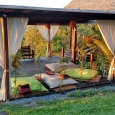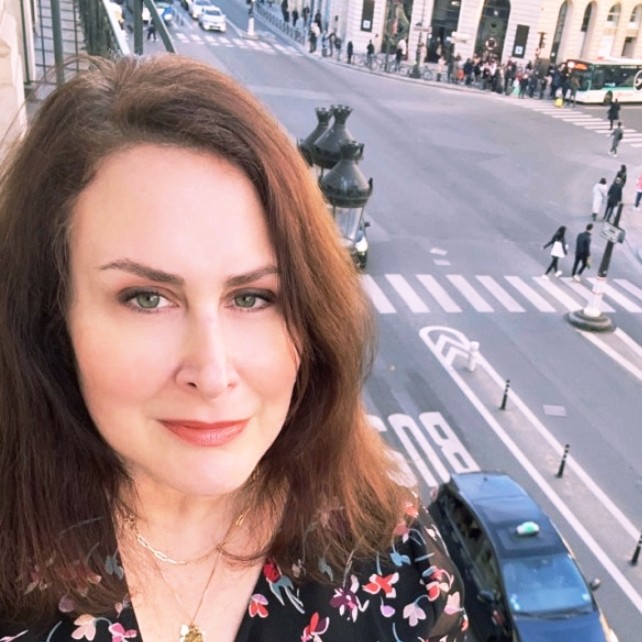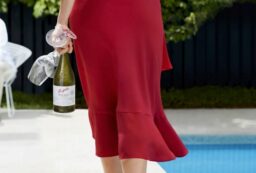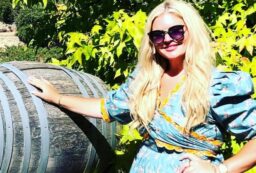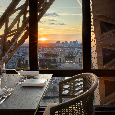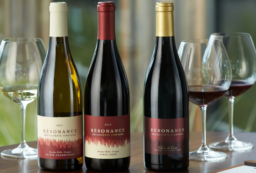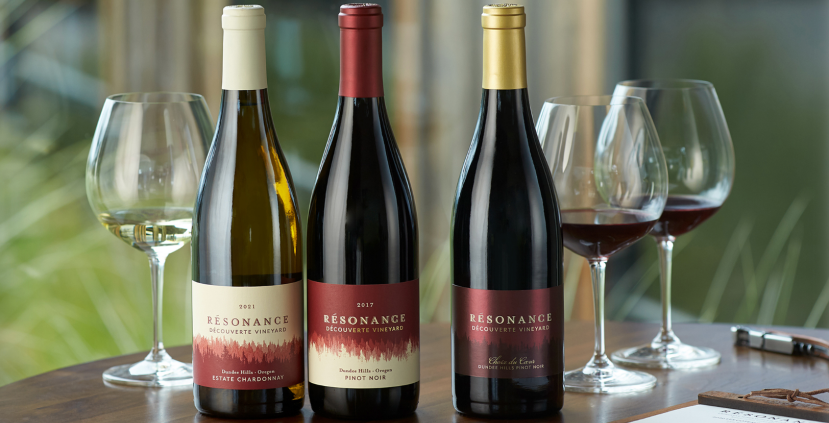
“A good vintner will always set out to try to produce the most beautiful fruit that he can,” Guillaume Large, a native of Pouilly-Fuissé in Burgundy, France, says with authority over a post-breakfast coffee at Cypress Mediterranean, an innovative restaurant anchoring the boutique property Atticus Hotel in downtown McMinnville, which anchors Oregon’s Willamette Valley. “If you have beautiful fruits, it’s easy to make a wine that will speak about the place it is created. At Résonance Estate, this is our job and our goal. This is why we invest and experiment with the best ways to farm, and the best way to produce beautiful fruits.”

Although Large came of age working in the family vineyard, planted by his great-grandfather, he’s not to the “estate” born like many of Burgundy’s generations-old wine producers. Large evolved into the internationally acclaimed winemaker behind Résonance Estate near McMinnville by following his heart, getting his Oenologist’s National Diploma at the Jules Guyot Institute of Dijon, and honing his winemaking skills out in the field and the vineyards. This got the attention of Pierre-Henry Gagey, Thibault Gagey, and Jacques Lardière of producer Maison Louis Jadot, established in 1859. Its top brass, however, recognized that to innovate and move beyond the winery’s tradition, they needed to think outside their hallowed DOC to create the first Jadot winery outside of France.
In other words, where there’s a Willamette, there was a way.
“Even as recently as 40 years ago, the French were sort of dismissive about what could be done outside of France,” he explains. “Italy and Spain were also dismissive of new world wines, including those produced in the United States. In Burgundy, you feel the tradition as you walk through the vineyards, and the heritage from the generations of winemakers before us. In Burgundy, by the law, there are rules to follow that one cannot break. In the Willamette Valley, exploration and experimentation are the rules, and Résonance Estate is where we can look to the future of winemaking.”

"In Burgundy, by law, there are rules to follow that winemakers cannot break. In the Willamette Valley, exploration and experimentation are the rules, and Résonance Estate is where we can look to the future of winemaking. "
In 2013, Large embarked on a journey to Oregon’s Willamette Valley. By 2017, he set down professional roots and a new home with his wife and son. Although this U.S. production region, which boasts 500 wineries, is firmly established in the New World, Large recognized the great affinity between his native Burgundy and Willamette Valley wine production regions in terroir, microclimates, and sun exposure. He also believes Résonance came together in a way that required patience and skill but produced superb results. By 2024, it encompassed 140 acres of vineyards divided up into Résonance, Jolie Mont, Koosah, and Découverte. The Carlton Grand Tasting Room and the Dundee Hills Tasting Salon provide space for indoor and outdoor private dining and wine-tasting sessions. Even in the heart of the Pacific Northwest, Résonance’s picturesque vineyards bring a definitive French sensibility to the settings where visitors can sample the results of Large’s convergence of terroir, French winemaking techniques, and modern winemaking technology in a scheduled tasting.

“In France, winemaking can be thought of as following a recipe which can guarantee something of quality if we follow it exactly,” Large says. “This is the total opposite in the Willamette Valley. You plant what we want and the way we want to get the production results we hope to achieve. It’s interesting because being free to do this is a good way to try different approaches. It’s a good way to do some tests and some experimentation, always keeping in mind that the customers will be the most important judges. What we do year after year, vintage after vintage, is strive to understand what techniques and blends work better here than in Burgundy. We’re about being proactive, aware of the conditions that define a certain production, and keeping the goal of quality front and center helps us decide if something we experiment with works. For example, we found that keeping a little bit of the grape stem in the wine during maceration is a technique that works well in the Willamette Valley but may not work well in Burgundy. Our being able to change things up a bit can enable us to create an interesting new expression of a given wine.”

One taste of one of Résonance’s wines such as the Willamette Valley Pinot Noir 2021, landing the #9 position on the “Wine Spectator” Top 100 2023, leaves no question that winemaking is not just in Large’s blood but his soul. The Résonance vineyards are perfect places to survey picturesque vineyards and sample the results of Large’s understanding of Oregonian and Burgundian terroir, French winemaking techniques, and modern winemaking technology in a scheduled tasting.
"McMinnville, Oregon checks all the boxes as the perfect base camp to take in everything the Willamette Valley has become known for among wine culinary aficionados. As it is impossible to hit all 500 wineries the region is home to, the downtown area is awash with restaurants and tasting rooms where one can sample different expressions of Chardonnay, Pinot Gris, Riesling, and Sauvignon Blanc or compare and contrast sips of the award-winning Pinot Noir wines from the region."
McMinnville checks all the boxes as the perfect base camp to take in everything the Willamette Valley has become known for among wine and culinary aficionados. As it is impossible to hit all 500 wineries in the region, the downtown area is awash with restaurants and tasting rooms where one can sample different expressions of Chardonnay, Pinot Gris, Riesling, and Sauvignon Blanc or compare and contrast sips of the award-winning Pinot Noir wines from the region.

Whether an oenophile’s visit is dedicated to Résonance Estate exclusively or a deeper dive into the other top wineries in the area, Atticus Hotel opened in 2018 makes for an ideal base camp. Conceived by Erin Stephenson & Brian Shea, it was designed to intentionally transcend the familiar “wine country inn” trope by mixing and matching modern and traditional furnishings and statement pieces from Oregon artisans. Pendleton bathrobes, bath amenities from Portland’s Maak Labs, and other surprises such as complimentary cappuccino and espresso made to order in the lobby firmly establish it’s a product of its Oregonian environment.

The aforementioned Cypress Mediterranean restaurant jazzes up wine-country mainstay dishes with global influences, particularly from Greece and Turkey. Breakfast is the star attraction, with fresh-baked pita accompanying most of the simpler dishes, and signatures like Ful Mudammas (green garbanzo beans, cumin, garlic, onion, poached egg, fried pita), Pomegranate pancakes, Shakshuka, and Turkish eggs with yogurt, pepper sauce, and herb salad. Humble Spirit is another popular hangout among local winemakers and oenophiles from everywhere else. Appetizers and main dishes are at once recognizable and surprising. Popular items include “Oregon Bay Shrimp Rolls,” a Pacific Northwest spin on a New England classic, “Albacore Confit,” an elevated deconstructed tuna salad alive with flavor, “Buttermilk Fried Half Chicken,” and perfect burgers, buttermilk biscuits, and other comfort foods.

Large is also a fan of The Kitchen at Middleground Farm, offering inventive cooking classes and a spotlight on the other agricultural bounties coming out of the Willamette Valley. Founder Jessica Hansen used past career experience—including teaching classes at Sur la Table and working with prestige appliance producer Sub-Zero as a corporate chef—as the foundation when she transformed an old farm into a place where “guests can better connect to their food through cooking lessons and farm tours. A guided walk around the farm is a complete beginners course in the course in sustainability and gardening., while her specialized cooking classes for adults, teens, and kids run the gamut from “Back to Basics,” to creating crowd-pleasing “Plant-Based Meals,” to specialized deep dives such as “Foraging Wild Mushrooms,” and “Brunch & Bubbles!”
Although Large is fiercely proud of his Burgundy roots and travels the U.S. and the world extensively to promote his internationally acclaimed wines, he is truly in his element in the heart of Oregon wine country. He regards the region’s complex weather systems, geography, and terroir not as challenges, but as opportunities to bring the best out of familiar grape varietals.

